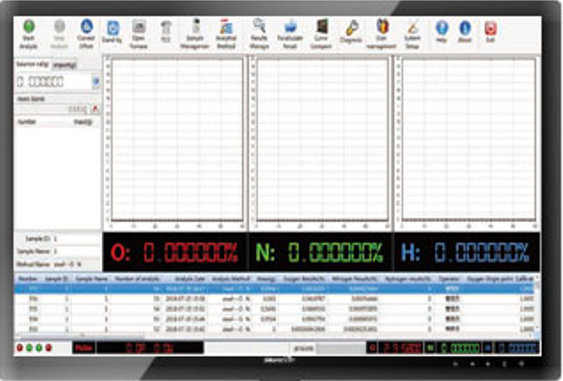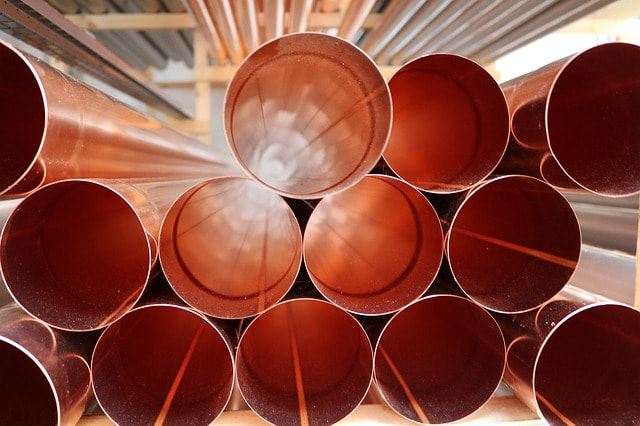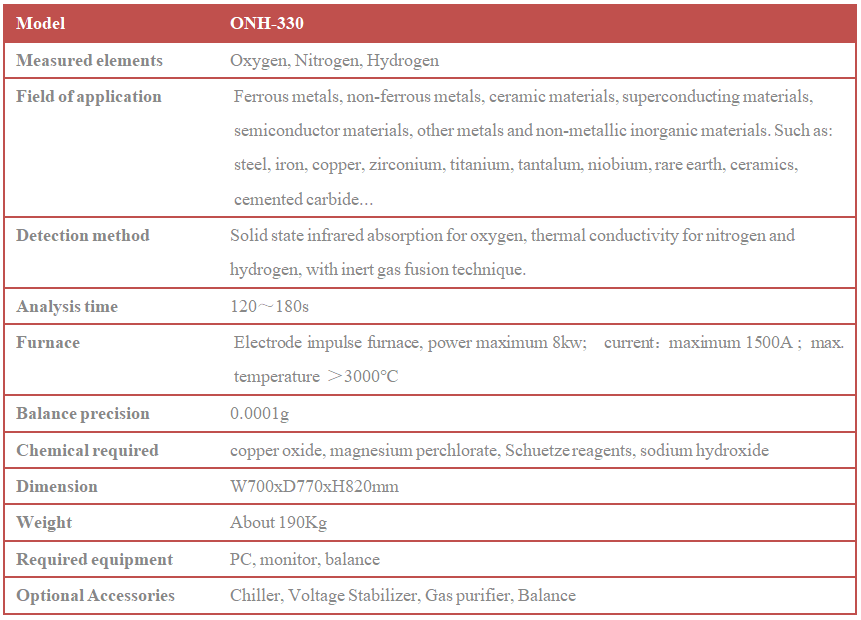Introduction
ONH-330 Oxygen/ Nitrogen/ Hydrogen analyzer uses an inert gas-protected pulse electrode furnace to melt and decompose samples, solid state infrared absorption for Oxygen, thermal conductivity for Nitrogen and Hydrogen; simultaneous Oxygen/ Nitrogen/ Hydrogen determination with one instrument.
Application Ranges
It is applicable to the determination of oxygen, nitrogen, hydrogen content in nonmetal solid materials such as ferrous metals, non-ferrous metals, superconducting materials, semiconductor materials, rare earth materials, and ceramic materials, such as steel, iron, copper, zirconium, titanium, and tantalum, cerium, rare earth, ceramics, alloys...
Features
- Digital closed-loop control pulse electrode furnace
- Powerful 8KW impulse furnace for temperature in excess of 3000℃
- Temperature programming control power, with constant power, constant current, constant voltage, slope control and other ways to increase temperature
- Instrument operation control circuit and data acquisition adopt modular, no drift design
- The integrated design of the whole machine, the layout is more reasonable, and the gas system is more airtight
- Simultaneous Oxygen/ Nitrogen or Oxygen/ Hydrogen with inert gas fusion technique
- Powerful catalyst furnace for precise Oxygen measurement
- Flexible configurations and measuring ranges for O, N, H
- High sensitivity IR and TC cells with low detection limits.
Oxygen, Nitrogen, Hydrogen Analyzer ONH-330
Configurations
The ONH-330 oxygen, nitrogen and hydrogen analyzer adopts an integrated and modular design and consists of six independent hardware module units including pulse electrode furnace, detection system, gas circuit system, power supply system, circuit system, and water circulation cooling system. The computer and electronic balance form a complete set of analytical instruments. The instrument not only has extremely high stability and reliability, but also has powerful functions but simple operation. It has no special requirements for users. It is an ideal choice for analyzing oxygen, nitrogen and hydrogen elements.
The upper computer of the instrument uses a Lenovo commercial desktop computer to control the whole machine, and the lower computer uses a 32-bit embedded ARM architecture microcomputer control and a 24-bit high-precision data acquisition system to meet the requirements for control accuracy and speed.

Oxygen, Nitrogen, Hydrogen Analyzer ONH-330
Software

Copyrighted analysis software, based on the Windows operating system, is powerful and user-friendly. The software supports instrument operation and data processing to meet the needs of different users.
Oxygen, Nitrogen, Hydrogen Analyzer ONH-330
Applications
ONH-330 is widely used for analyzing alloys, aluminum, ashes, carbides, cast iron, ceramics, copper, ferroalloys, iron, metals, ores, refractory metals, silicon, steel etc. please reffer to the applications notes accordingly in our website blogs.


Oxygen, Nitrogen, Hydrogen Analyzer ONH-330
Technical Data

Oxygen, Nitrogen, Hydrogen Analyzer ONH-330
Functional Principle
ONH-330 Oxygen/ Nitrogen/ Hydrogen analyzer is equipped with 8.0KW electrode impulse furnace, with temperature in excess of 3000℃, The electrode pulse furnace can increase the temperature by program. The power control or current control can be selected to achieve the best melting of the sample.
The use of inert gas (argon, helium, nitrogen) as carrier gas is determined by analysis elements, samples of various metallic & non-metallic materials such as ferrous metals, non-ferrous metals, ceramic materials, superconducting materials, and semiconductor materials are thermally decomposed at a high temperature. Oxygen in the sample reacts with carbon in the graphite crucible to produce CO, and nitrogen and hydrogen respectively escape as N2 andH2.
The carrier gas sends mixed gases to the reformer. CO is converted to CO2, and the mixed gas passing through the reformer is sent to the infrared detection system for detection, the mixed gas containing N2 and H2 is sent to a thermal conductivity detector after the CO2 and other components are removed. Infrared detection systems and thermal conductivity detection systems process the measured signals through amplification, A/D conversion, etc. and send them to a computer for data processing to calculate the content of oxygen and nitrogen in the sample.
